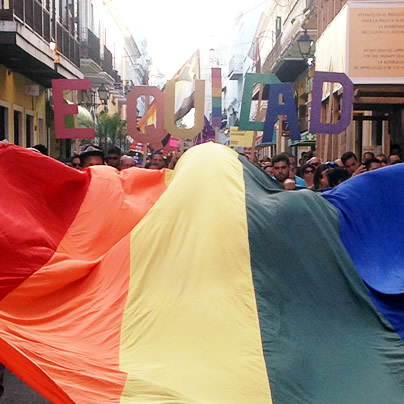National
Thousands attend Puerto Rico LGBT rights march
San Juan Mayor Carmen Yulín Cruz unfurled Pride flag at City Hall


Marchers carry a Pride flag and crosses with “they discriminate” written on them through Old San Juan on May 17. (Washington Blade photo by Michael K. Lavers)
SAN JUAN, Puerto Rico – Thousands marched through the streets of the Puerto Rican capital on Friday in support of LGBT rights.
San Juan Mayor Carmen Yulín Cruz and Sen. Ramón Nieves Pérez, who sponsored the sweeping anti-LGBT non-discrimination bill the Senate on Thursday passed by a 15-11 vote margin, unfurled an LGBT Pride flag from the balcony of City Hall as marchers passed. She stood with members of Butterflies Trans Association, a trans advocacy group, while wearing a white hand band with the word “equity” on it as she spoke from the steps of the Puerto Rican capitol at the end of the march.
“I say from the bottom of my heart to those who are listening to us — all of Puerto Rico; we are all equal,” Yulín said.
Alicia Burgos, the mother of Pedro Julio Serrano of the National Gay and Lesbian Task Force, and his father spoke to marchers from the back of a pick-up truck that stopped near Plaza de Colón in Old San Juan.
“We are marching against homophobia,” she said.
The march, which was one of dozens around the world that commemorated the annual International Day Against Homophobia, took place hours after a Puerto Rican Senate committee held a hearing on a bill that would extend second parent adoption rights to gays and lesbians.
The Puerto Rico Supreme Court in February narrowly upheld the island’s ban on gay second parent adoptions in response to the case of Dr. Ángeles Acosta Rodríguez who sought to adopt the child her partner of 25 years, Dr. Carmen Milagros Vélez Vega, conceived through in vitro fertilization. Vélez received a standing ovation from the adoption measure’s supporters who attended the hearing after she finished her testimony with her partner and their 12-year-old daughter by her side.
A third bill that three representatives introduced earlier this year would add sexual orientation and gender identity and expression to the island’s anti-domestic violence laws.
Advocates continue to point to the three aforementioned bills as significant movement in support of rights for LGBT Puerto Ricans since Gov. Alejandro García Padilla and Yulín, who issued two LGBT-specific executive orders on Monday, took their respective offices in January. In spite of this progress, they maintain anti-LGBT discrimination and violence remain rampant throughout the island.
Yulín and others who spoke during the march referenced Jorge Steven López Mercado; a gay teenager whose decapitated, dismembered and partially burned body was found dumped along a remote roadside near Cayey in 2009. One march participant even pretended he was dead on the sidewalk in front of the Puerto Rican Capitol as others outlined his body with masking tape and placed evidence markers above rocks with anti-gay slurs written onto them.

A group from the Puerto Rican city of Ponce takes part in a march for LGBT rights in San Juan on May 17. (Washington Blade photo by Michael K. Lavers)
“I, as the mother of a gay individual, say I am proud to be here,” one member of the Butterflies Trans Association said as she spoke to the crowd from the steps of the Puerto Rican Capitol. “We are fighting as a movement to tell (lawmakers) that we are in search of a place where [LGBT Puerto Ricans] can be successful, a place where we can take care of our people.”
Eduardo, who traveled to San Juan from Ponce with a group of 150 people, agreed as he spoke to the Blade near Plaza de Colón.
“We are here because we want equality,” he said. “We want the same equality that everybody else has.”

The Comings & Goings column is about sharing the professional successes of our community. We want to recognize those landing new jobs, new clients for their business, joining boards of organizations and other achievements. Please share your successes with us at [email protected].
Congratulations to Gil Pontes III on his recent appointment to the Financial Advisory Board for the City of Wilton Manors, Fla. Upon being appointed he said, “I’m honored to join the Financial Advisory Board for the City of Wilton Manors at such an important moment for our community. In my role as Executive Director of the NextGen Chamber of Commerce, I spend much of my time focused on economic growth, fiscal sustainability, and the long-term competitiveness of emerging business leaders. I look forward to bringing that perspective to Wilton Manors — helping ensure responsible stewardship of public resources while supporting a vibrant, inclusive local economy.”
Pontes is a nonprofit executive with years of development, operations, budget, management, and strategic planning experience in 501(c)(3), 501(c)(4), and political organizations. Pontes is currently executive director of NextGen, Chamber of Commerce. NextGen Chamber’s mission is to “empower emerging business leaders by generating insights, encouraging engagement, and nurturing leadership development to shape the future economy.” Prior to that he served as managing director of The Nora Project, and director of development also at The Nora Project. He has held a number of other positions including Major Gifts Officer, Thundermist Health Center, and has worked in both real estate and banking including as Business Solutions Adviser, Ironwood Financial. For three years he was a Selectman, Town of Berkley, Mass. In that role, he managed HR and general governance for town government. There were 200+ staff and 6,500 constituents. He balanced a $20,000,000 budget annually, established an Economic Development Committee, and hired the first town administrator.
Pontes earned his bachelor’s degree in political science from the University of Massachusetts, Dartmouth.
Kansas
ACLU sues Kansas over law invalidating trans residents’ IDs
A new Kansas bill requires transgender residents to have their driver’s licenses reflect their sex assigned at birth, invalidating current licenses.

Transgender people across Kansas received letters in the mail on Wednesday demanding the immediate surrender of their driver’s licenses following passage of one of the harshest transgender bathroom bans in the nation. Now the American Civil Liberties Union is filing a lawsuit to block the ban and protect transgender residents from what advocates describe as “sweeping” and “punitive” consequences.
Independent journalist Erin Reed broke the story Wednesday after lawmakers approved House Substitute for Senate Bill 244. In her reporting, Reed included a photo of the letter sent to transgender Kansans, requiring them to obtain a driver’s license that reflects their sex assigned at birth rather than the gender with which they identify.
According to the reporting, transgender Kansans must surrender their driver’s licenses and that their current credentials — regardless of expiration date — will be considered invalid upon the law’s publication. The move effectively nullifies previously issued identification documents, creating immediate uncertainty for those impacted.
House Substitute for Senate Bill 244 also stipulates that any transgender person caught driving without a valid license could face a class B misdemeanor, punishable by up to six months in jail and a $1,000 fine. That potential penalty adds a criminal dimension to what began as an administrative action. It also compounds the legal risks for transgender Kansans, as the state already requires county jails to house inmates according to sex assigned at birth — a policy that advocates say can place transgender detainees at heightened risk.
Beyond identification issues, SB 244 not only bans transgender people from using restrooms that match their gender identity in government buildings — including libraries, courthouses, state parks, hospitals, and interstate rest stops — with the possibility for criminal penalties, but also allows for what critics have described as a “bathroom bounty hunter” provision. The measure permits anyone who encounters a transgender person in a restroom — including potentially in private businesses — to sue them for large sums of money, dramatically expanding the scope of enforcement beyond government authorities.
The lawsuit challenging SB 244 was filed today in the District Court of Douglas County on behalf of anonymous plaintiffs Daniel Doe and Matthew Moe by the American Civil Liberties Union, the ACLU of Kansas, and Ballard Spahr LLP. The complaint argues that SB 244 violates the Kansas Constitution’s protections for personal autonomy, privacy, equality under the law, due process, and freedom of speech.
Additionally, the American Civil Liberties Union filed a temporary restraining order on behalf of the anonymous plaintiffs, arguing that the order — followed by a temporary injunction — is necessary to prevent the “irreparable harm” that would result from SB 244.
State Rep. Abi Boatman, a Wichita Democrat and the only transgender member of the Kansas Legislature, told the Kansas City Star on Wednesday that “persecution is the point.”
“This legislation is a direct attack on the dignity and humanity of transgender Kansans,” said Monica Bennett, legal director of the ACLU of Kansas. “It undermines our state’s strong constitutional protections against government overreach and persecution.”
“SB 244 is a cruel and craven threat to public safety all in the name of fostering fear, division, and paranoia,” said Harper Seldin, senior staff attorney for the ACLU’s LGBTQ & HIV Rights Project. “The invalidation of state-issued IDs threatens to out transgender people against their will every time they apply for a job, rent an apartment, or interact with police. Taken as a whole, SB 244 is a transparent attempt to deny transgender people autonomy over their own identities and push them out of public life altogether.”
“SB 244 presents a state-sanctioned attack on transgender people aimed at silencing, dehumanizing, and alienating Kansans whose gender identity does not conform to the state legislature’s preferences,” said Heather St. Clair, a Ballard Spahr litigator working on the case. “Ballard Spahr is committed to standing with the ACLU and the plaintiffs in fighting on behalf of transgender Kansans for a remedy against the injustices presented by SB 244, and is dedicated to protecting the constitutional rights jeopardized by this new law.”
National
After layoffs at Advocate, parent company acquires ‘Them’ from Conde Nast
Top editorial staff let go last week

Former staff members at the Advocate and Out magazines revealed that parent company Equalpride laid off a number of employees late last week.
Those let go included Advocate editor-in-chief Alex Cooper, Pride.com editor-in-chief Rachel Shatto, brand partnerships manager Erin Manley, community editor Marie-Adélina de la Ferriére, and Out magazine staff writers Moises Mendez and Bernardo Sim, according to a report in Hollywood Reporter.
Cooper, who joined the company in 2021, posted to social media that, “Few people have had the privilege of leading this legendary LGBTQ+ news outlet, and I’m deeply honored to have been one of them. To my team: thank you for the last four years. You’ve been the best. For those also affected today, please let me know how I can support you.”
The Advocate’s PR firm when reached by the Blade said it no longer represents the company. Emails to the Advocate went unanswered.
Equalpride on Friday announced it acquired “Them,” a digital LGBTQ outlet founded in 2017 by Conde Nast.
“Equalpride exists to elevate, celebrate and protect LGBTQ+ storytelling at scale,” Equalpride CEO Mark Berryhill said according to Hollywood Reporter. “By combining the strengths of our brands with this respected digital platform, we’re creating a unified ecosystem that delivers even more impact for our audiences, advertisers, and community partners.”
It’s not clear if “Them” staff would take over editorial responsibilities for the Advocate and Out.
















